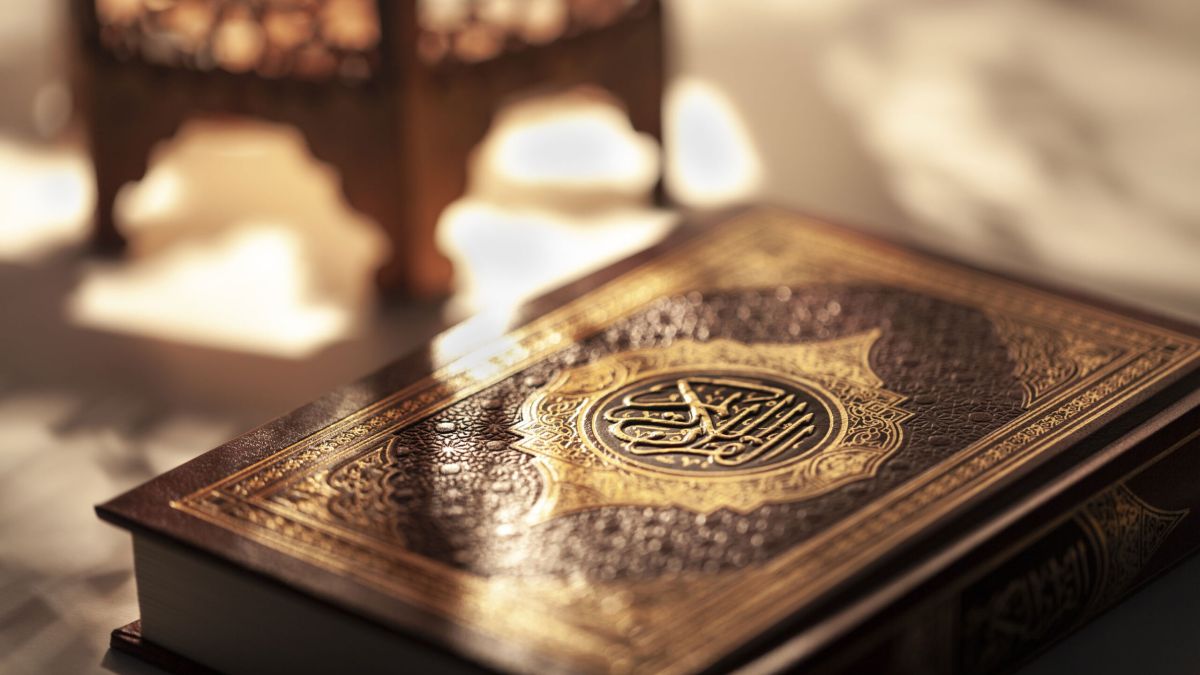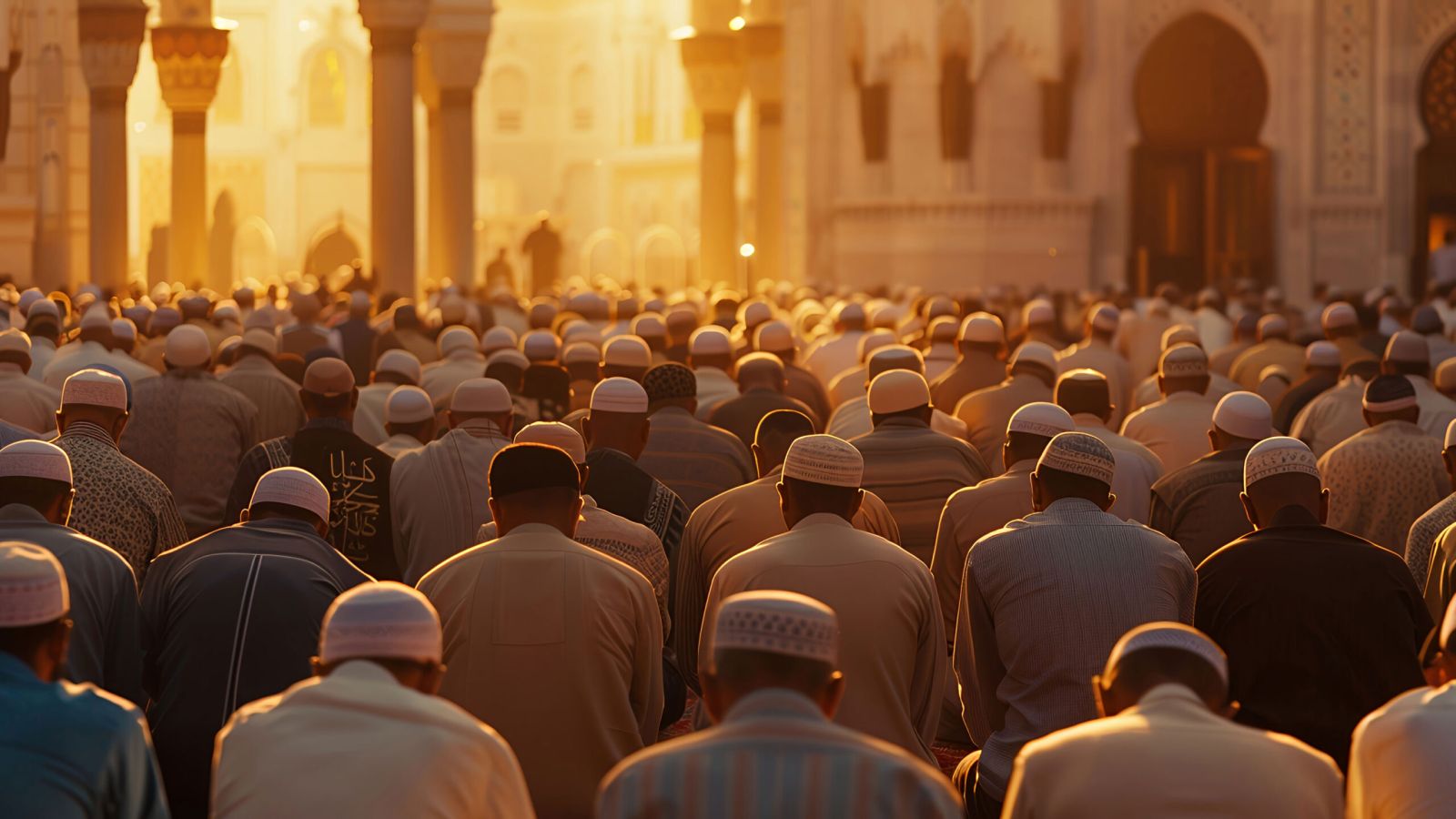Allāh Speaking with Plural Pronouns (We/Our/Us) in the Qurʾān
Shaykh al-Islām Ibn Taymiyyah, Imām Muḥammad Amīn al-Shanqīṭī, Imām Muḥammad ibn Ṣāliḥ al-ʿUthaymīn


The usage of plural pronouns in the Qurʿān (such as “Indeed, We”) has two purposes in the Arabic language. The first is the widely-known and accepted usage to indicate a single entity who possesses associates in the execution of an act [e.g., the angels, the prophets etc.]. The second is to indicate the greatness of a single deity to whom a multitude of standalone attributes may be ascribed, One who possesses helpers that follow His command, while not being partners unto Him.
So, if the Christians choose to stubbornly persist in the use of verses like:
إِنَّا نَحْنُ نَزَّلْنَا الذِّكْرَ وَإِنَّا لَهُ لَحَافِظُونَ
“Verily We: It is We Who have sent down the Dhikr (i.e. the Qurʾān) and surely, We will guard it (from corruption).”
(Al-Ḥijr, 15:9)
To evidence their position of worshiping more than one deity [i.e., the trinity], the entirely clear, plainly evident statement to which this issue must be returned are verses like:
وَإِلَٰهُكُمْ إِلَٰهٌ وَاحِدٌ ۖ لَّا إِلَٰهَ إِلَّا هُوَ الرَّحْمَٰنُ الرَّحِيمُ
“And your Ilāh (God) is One Ilāh (God – Allāh), Lā ilāha illā Huwa (there is none who has the right to be worshiped but He), the Most Beneficent, the Most Merciful.”
(Al-Baqarah, 2:163)
And the likeness of such verses that may only be interpreted in a single way, alleviating and dispelling any confusion. For referencing Allāh with plurality in the Qurʿān is meant only to denote the greatness He is most deserving of, the perfection and greatness of His Names and attributes, and the obedience of the angels and other created beings to Him.1
There is no difference of opinion among the Arabic linguists, nor among the Muslims themselves, that plural forms of words in Arabic may be used to indicate:
- The greatness of the one being referred to only; that is, not meant as an indication of multiple separate entities in any way. Rather, when plural wordings are used in this context, they are always referring to a single entity.
- Multiple separate entities as is well-known.
Considering this, we may then acknowledge that Allāh references Himself with plural pronouns in many places in the grand Qurʾān. This plurality is meant only to denote His own greatness, not meant as an indication of multiple entities or that He possesses partners or equals—Glorified and High be He from such great falsehood! For example, His saying:
إِنَّا نَحْنُ نَزَّلْنَا الذِّكْرَ وَإِنَّا لَهُ لَحَافِظُونَ
“Verily We: It is We Who have sent down the Dhikr (i.e. the Qurʾān) and surely, We will guard it (from corruption).”
(Al-Ḥijr, 15:9)
The plural forms [highlighted above] are not meant to indicate that another entity revealed the Qurʾān with Him, or that another guards it from corruption besides Him—the Most High. Rather, He is the One who has revealed it, and He alone guards it from corruption. Other examples include:
أَفَرَأَيْتُم مَّا تُمْنُونَ ﴿٥٨﴾ أَأَنتُمْ تَخْلُقُونَهُ أَمْ نَحْنُ الْخَالِقُونَ﴿٥٩﴾
“Then tell Me (about) the human semen that you emit. Is it you who creates it (i.e. make this semen into a perfect human being), or are We the Creator?”
(Al-Wāqiʿah, 56:58-59)
أَأَنتُمْ أَنزَلْتُمُوهُ مِنَ الْمُزْنِ أَمْ نَحْنُ الْمُنزِلُونَ
“Is it you who cause it from the rainclouds to come down, or are We the Causer of it to come down?”
(Al-Wāqiʿah, 56:69)
أَأَنتُمْ أَنشَأْتُمْ شَجَرَتَهَا أَمْ نَحْنُ الْمُنشِئُونَ
“Is it you who made the tree thereof to grow, or are We the Grower?”
(Al-Wāqiʿah, 56:72)
And there are many other verses that use plurality in this way. Regarding such verses, clear evidence has already proven that the Creator is One, the Causer of rainfall is One, and the Grower is One.2
The pronouns that are used to refer to Allāh in the Qurʾān may be either singular or plural for the purpose of indicating His greatness. Examples of the plural pronouns have already been mentioned. As for the singular:
إِنِّي جَاعِلٌ فِي الْأَرْضِ خَلِيفَةً
“Verily, I am going to place (mankind) generations after generations on earth.”
(Al-Baqarah, 2:30)
إِذْ قَالَ رَبُّكَ لِلْمَلَائِكَةِ إِنِّي خَالِقٌ بَشَرًا مِّن طِينٍ
“(Remember) when your Lord said to the angels: ‘Truly, I am going to create man from clay’.”
(Ṣād, 38:71)
قَالَ إِنِّي أَعْلَمُ مَا لَا تَعْلَمُونَ
“He (Allah) said: ‘I know that which you do not know.’”
(Al-Baqarah, 2:30)
It may be noted here that the singular pronoun is also used contextually to indicate His greatness and exaltation, like the creation of man from clay which none is able to do other than Him. Similarly, it is used to imply that He alone—the Glorified—possesses knowledge of certain matters when informing the angels that He knows that which they do not. Therefore, whether Allāh uses the singular or plural pronoun to refer to Himself, they both indicate His greatness—the Glorified, the High. This greatness may be explicitly clear from the wording of the text itself or implied from the context and subject matter.3
Shaykh Muḥammad ibn Ṣāliḥ al-ʿUthaymīn said regarding the verse:
إِنَّا عَرَضْنَا الْأَمَانَةَ عَلَى السَّمَاوَاتِ وَالْأَرْضِ وَالْجِبَالِ فَأَبَيْنَ أَن يَحْمِلْنَهَا وَأَشْفَقْنَ مِنْهَا وَحَمَلَهَا الْإِنسَانُ ۖ إِنَّهُ كَانَ ظَلُومًا جَهُولًا
“Truly, We did offer Al-Amānah (the trust or moral responsibility or honesty and all the duties which Allāh has ordained) to the heavens and the earth, and the mountains, but they declined to bear it and were afraid of it (i.e. afraid of Allāh’s Torment). But man bore it. Verily, he was unjust (to himself) and ignorant (of its results).”
(Al-Aḥzāb, 33:72)
Allāh, here, refers to himself using the plural “We” to indicate His greatness—the Exalted in Might. For He—the Glorified—is the Greatest, none is greater than Him.
The Christians have attempted to confuse some Muslims among the general populace by claiming that Allāh—the Glorified, the High—constitutes multiple deities [i.e. the trinity] because He says in reference to Himself ““Truly, We did offer”, and He also says:
إِنَّا نَحْنُ نُحْيِي الْمَوْتَىٰ
“Verily, We give life to the dead”
(Yāsīn, 36:12)
إِنَّا نَحْنُ نَزَّلْنَا الذِّكْرَ وَإِنَّا لَهُ لَحَافِظُونَ
“Verily We: It is We Who have sent down the Dhikr (i.e. the Qurʾān) and surely, We will guard it (from corruption).”
(Al-Ḥijr, 15:9)
So they use such verses to confuse people, saying: “These plural pronouns prove multiplicity”. However, in the Arabic language, plurality is used to denote either multiplicity or greatness. Also, the Christians have chosen to conveniently ignore other verses that clearly prove the correct interpretation of the aforementioned verses like:
وَإِلَٰهُكُمْ إِلَٰهٌ وَاحِدٌ ۖ لَّا إِلَٰهَ إِلَّا هُوَ الرَّحْمَٰنُ الرَّحِيمُ
“And your Ilāh (God) is One Ilāh (God – Allāh), Lā ilāha illā Huwa (there is none who has the right to be worshiped but He), the Most Beneficent, the Most Merciful.”
(Al-Baqarah, 2:163)
For such is the state of people whose hearts possess a deviation from the truth. They intentionally and obstinately choose to follow only the verses and ḥadīth whose meanings may not be entirely clear to them in an attempt to find contradictions therein. In any case, Allāh has already foreordained those who would protect, maintain and guard His religion, resolving such confusions and clarifying the truth to where it is manifest. They are the ones who are firmly grounded in Islamic knowledge, as the Most High said:
هُوَ الَّذِي أَنزَلَ عَلَيْكَ الْكِتَابَ مِنْهُ آيَاتٌ مُّحْكَمَاتٌ هُنَّ أُمُّ الْكِتَابِ وَأُخَرُ مُتَشَابِهَاتٌ ۖ فَأَمَّا الَّذِينَ فِي قُلُوبِهِمْ زَيْغٌ فَيَتَّبِعُونَ مَا تَشَابَهَ مِنْهُ ابْتِغَاءَ الْفِتْنَةِ وَابْتِغَاءَ تَأْوِيلِهِ ۗ
“It is He Who has sent down to you (Muḥammad (صلى الله عليه وسلم)) the Book”
That is, this Qurʾān,
“In it are Verses that are entirely clear, they are the foundations of the Book [and those are the Verses of Al-Aḥkam (commandments, etc.), Al-Farāʾiḍ (obligatory duties) and Al-Ḥudūd (legal laws for the punishment of thieves, adulterers, etc.)]; and others not entirely clear. So as for those in whose hearts there is a deviation they follow that which is not entirely clear thereof, seeking al-Fitnah (polytheism and trials, etc.), and seeking for its hidden meanings,”
(Āli-ʿImrān 3:&)
Here, two types of verses are mentioned: those whose meaning is entirely clear and others that may not be.
“So as for those in whose hearts there is a deviation”
That is, a deviation from the truth, desiring and coveting misguidance.
“they follow that which is not entirely clear thereof,”
That is, while completely abandoning all the other verses whose meanings are entirely clear and manifest.
“seeking al-Fitnah (polytheism and trials, etc.),”
That is, seeking to turn people away from their religion
“and seeking for its hidden meanings,”
That is, seeking to corrupt the interpretation of those verses whose meanings are not entirely clear in accordance with their desires and to reinforce their own false narratives.
Thus, the plurality in the aforementioned verses is meant only to denote greatness.4
Furthermore, in response to the Christians who would make such a claim, the ones firmly rooted in knowledge should say: This claim that you have postulated—based on your own confusion—Allāh has already declared you disbelievers and liars in relation to it. Listen well to the saying of the Most High:
لَّقَدْ كَفَرَ الَّذِينَ قَالُوا إِنَّ اللَّهَ ثَالِثُ ثَلَاثَةٍ ۘ وَمَا مِنْ إِلَٰهٍ إِلَّا إِلَٰهٌ وَاحِدٌ
“Surely, disbelievers are those who said: “Allāh is the third of the three (in a Trinity).” But there is no ilāh (god) (none who has the right to be worshiped) but One Ilāh (God-Allāh)”
(Al-Māʾidah, 5:73)
That is, they have disbelieved by postulating the claim that Allāh is a third of three.5
Endnotes:
[1] Source: Al-Tadmurīyyah: 109-110
[2] Source: Aḍwāʾ al-Bayān 7:495-496
[3] Source: Aḍwāʾ al-Bayān 9:31
[4] Source: Tafsīr al-ʿUthaymīn: Al-Aḥzāb: 535
[5] Source: Majmūʿ Fatāwá wa-Rasāʾil 4:187.
Translated by: Riyāḍ al-Kanadī
Most Popular: Last 30 Days

















